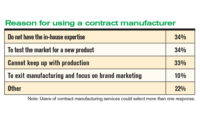Food sector lagging in climate action
A new Ceres report says failure to act now could have serious consequences.

Photo courtesy of apichon_tee via gettyimages.com.

For the second year in a row, Dairy Foods is focusing its July issue on the topic of sustainability. The widely accepted definition of sustainability is “meeting the needs of the present without compromising the ability of future generations to meet their needs.” The term encompasses three pillars: environmental, economic, and societal sustainability, but the environmental pillar traditionally has been the emphasis.
Call for action
Despite all of the attention given to environmental sustainability in recent years — and to climate change, in particular — a new report from the nonprofit organization Ceres reveals that few U.S. food and beverage companies have disclosed their climate transition strategies — or taken concrete actions to achieve them. The report, “The Investor Guide to Climate Transition Plans in the U.S. Food Sector,” notes that even in an era of greater corporate climate disclosure and commitments to greenhouse-gas-emissions reduction targets, net-zero targets and other climate-related goals, many companies have failed to adequately disclose sufficient information to investors on how they intend to achieve climate change-related ambitions.
“The food sector is a critical player in the transition to a net-zero emissions economy, but the sector as a whole has been slow to translate emissions reductions targets into action,” says Julie Nash, senior program director for food and forests at Ceres.
As of January 2022, only 21 of the 50 highest greenhouse gas-emitting North American food companies tracked by the Ceres’ “Food Emissions 50” initiative had set any short-term emissions reduction targets inclusive of Scope 3 emissions, the largest source of emissions in this sector. Moreover, none of them had published a climate transition plan, Ceres notes.
“The global food system is responsible for approximately one-third of global emissions, and the Intergovernmental Panel on Climate Change recently outlined how global temperature rise stands to negatively affect the global economy, food security, and both human and planetary health,” the report states.
It is time for food and beverage companies — including dairy processors — to take meaningful action regarding climate change.
“Failure to act now may lead to significant economic disruptions in this sector and beyond,” the report states. “Adapting to the predicted severe impacts of climate change later in the century will be much costlier than mitigating climate change as much as possible today.”
On a side note
As I write this column, I am preparing to leave my role as editor-in-chief of Dairy Foods. I am looking forward to “semi-retirement” and the extra free time that will come with it. I will, however, miss covering the dairy processing industry — and working with some great people on the Dairy Foods staff.
A special shout-out goes to our uber-talented designer, Lindsay Leusby, who makes our eMagazine sparkle. And I hope you will join me in giving a warm welcome to Barbara Harfmann, Dairy Foods’ new managing editor — who spent the last seven years with our sister publication, Beverage Industry.
It has been an interesting and event-packed five years! I wish all of you the best in your future dairy endeavors.
Looking for a reprint of this article?
From high-res PDFs to custom plaques, order your copy today!






